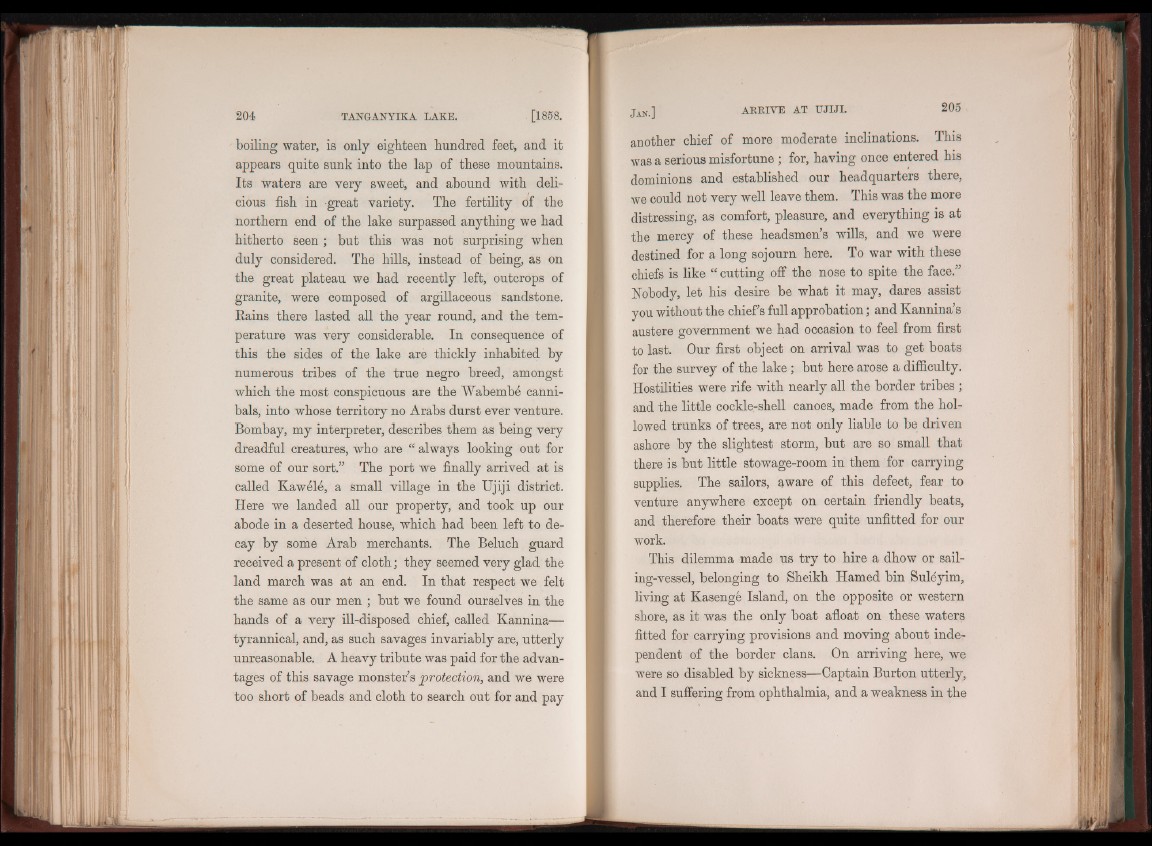
boiling water, is only eighteen hundred feet, and it
appears quite sunk into the lap of these mountains.
Its waters are very sweet, and abound with delicious
fish in great variety. The fertility of the
northern end of the lake surpassed anything we had
hitherto seen; but this was not surprising when
duly considered. The hills, instead of being, as on
the great plateau we had recently left, outcrops of
granite, were composed of argillaceous sandstone.
Eains there lasted all the year round, and the temperature
was very considerable. In consequence of
this the sides of the lake are thickly inhabited by
numerous tribes of the true negro breed, amongst
which the most conspicuous are the Wabembe cannibals,
into whose territory no Arabs durst ever venture.
Bombay, my interpreter, describes them as being very
dreadful creatures, who are “ always looking out for
some of our sort.” The port we finally arrived at is
called Kawele, a small village in the Ujiji district.
Here we landed all our property, and took up our
abode in a deserted house, which had been left to decay
by some Arab merchants. The Beluch guard
received a present of cloth; they seemed very glad the
land march was at an end. In that respect we felt
the same as our men ; but we found ourselves in the
hands of a very ill-disposed chief, called Kannina—
tyrannical, and, as such savages invariably are, utterly
unreasonable. A heavy tribute was paid for the advantages
of this savage monster’s protection, and we were
too short of beads and cloth to search out for and pay
another chief of more moderate inclinations. This
was a serious misfortune ; for, having once entered his
dominions and established our headquarters there,
we could not very well leave them. This was the more
distressing, as comfort, pleasure, and everything is at
the mercy of these headsmen’s wills, and we were
destined for a long sojourn here. To war with these
chiefs is like “ cutting off the nose to spite the face.”
Nobody, let his desire be what it may, dares assist
you without the chiefs full approbation; and Kannina’s
austere government we had occasion to feel from first
to last. Our first object on arrival was to get boats
for the survey of the lake ; but here arose a difficulty.
Hostilities were rife with nearly all the border tribes ;
and the little cockle-shell canoes, made from the hollowed
trunks of trees, are not only liable to be driven
ashore by the slightest storm, but are so small that
there is but little stowage-room in them for carrying
supplies. The sailors, aware of this defect, fear to
venture anywhere except on certain friendly beats,
and therefore their boats were quite unfitted for our
work.
This dilemma made us try to hire a dhow or sailing
vessel, belonging to Sheikh Hamed bin Suldyim,
living at Kasenge Island, on the opposite or western
shore, as it was the only boat afloat on these waters
fitted for carrying provisions and moving about independent
of the border clans. On arriving here, we
were so disabled by sickness—Captain Burton utterly,
and I suffering from ophthalmia, and a weakness in the